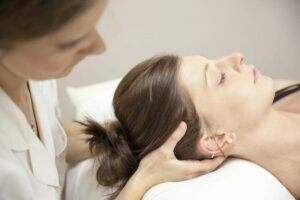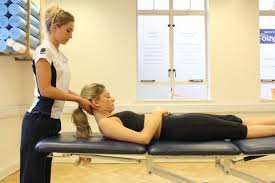Do you feel dizzy when you lie down? If so, you’re not alone. Dizziness when lying down is a common problem that can have many different causes. In this blog post, we will discuss the causes, treatments, and prevention of dizziness when lying down. We hope this information helps you get to the bottom of your dizziness and find relief!
Contents
Understanding Dizziness When Lying Down

Dizziness when lying down can also be caused by various medical conditions. These include a disorder of the inner ear called benign paroxysmal positional vertigo (BPPV). This condition is characterized by brief episodes of dizziness or spinning sensations that occur when you change positions suddenly, such as when you lie down. It often resolves on its own but can be treated with medications or physical therapy.
Causes Of Dizziness When Lying Down
Causes of dizziness when lying down can include a number of factors:
Inner ear infection
An inner ear infection can cause dizziness when lying down due to the buildup of fluid in the inner ear, which can interfere with normal balance and equilibrium.
Low blood pressure
Blood pressure naturally drops when you lie down, and for some people, this decrease can result in dizziness.
Benign paroxysmal positional vertigo (BPPV)
BPPV is a disorder of the inner ear in which small pieces of debris accumulate and interfere with the normal functioning of the balance centres in the ear. Symptoms include dizziness when changing position, such as lying down or rolling over in bed.
Anxiety
Stress and anxiety can cause dizziness when lying down due to a rush of adrenaline. Anxiety can also cause an increase in heart rate, which can make it difficult to relax and fall asleep. For instance, people who are overly stressed may find that they become dizzy when they lie down.
Hypoglycemia
Low blood sugar can cause a person to feel dizzy when they lie down due to the body’s sudden inability to provide enough energy.
Cardiovascular issues
Heart conditions, such as arrhythmia, can cause a person to become dizzy when lying down due to the body’s reduced ability to pump blood effectively.
Medication
Certain medications can cause dizziness as a side effect, especially if taken in combination. They may also cause dizziness when a person lies down, as the body adjusts to the medication.
Dehydration
Dehydration can lead to dizziness when lying down due to the body’s inability to maintain normal blood pressure and circulation.
Anaemia
A lack of iron in the body can lead to anaemia, which can cause dizziness due to a decrease in oxygen-rich blood circulating through the body.
Cardiovascular conditions
Certain heart conditions, such as arrhythmia.
If you experience dizziness that is accompanied by other symptoms such as nausea, confusion, or lightheadedness, it is important to contact your doctor. Your physician can help diagnose the underlying cause of your dizziness and provide you with appropriate treatment options.
What Symptoms Should You Look Out For?
If you think you may have a gallbladder problem, it’s important to look out for certain symptoms. These include:
- Pain in the upper right side of your abdomen or below the breastbone
- Pain that spreads to the back or shoulder blade
- Nausea and vomiting
- Bloating and gas
- Indigestion or heartburn
- Pain that is worse after eating, especially fatty foods
- Fever or chills
- Jaundice (yellowing of the skin and eyes)
- Dark urine or clay-coloured stools.
If you experience any combination of these symptoms, contact your doctor for further evaluation and diagnosis. It is important to receive prompt medical attention as early detection can help reduce the chances of further complications.
In addition to these signs, you may also experience abdominal tenderness or bloating after eating a meal, especially if it contains fatty foods. This could be an indication that your gallbladder is not functioning properly. If you have any of these symptoms, it is important to contact your doctor for further evaluation and diagnosis. They may recommend lifestyle changes or medical treatment depending on the severity of your condition.
Treatment is Available for Dizziness When Lying Down
 The treatment for dizziness when lying down will depend on the underlying cause. In some cases, lifestyle modifications may be helpful, such as avoiding certain medications that can contribute to dizziness or reducing stress levels. If an inner ear disorder is to blame, your doctor may prescribe medications to help reduce symptoms. Other treatments may include physical therapy, vestibular rehabilitation, and balance retraining exercises. In more severe cases, surgery may be recommended to correct balance issues caused by inner ear problems.
The treatment for dizziness when lying down will depend on the underlying cause. In some cases, lifestyle modifications may be helpful, such as avoiding certain medications that can contribute to dizziness or reducing stress levels. If an inner ear disorder is to blame, your doctor may prescribe medications to help reduce symptoms. Other treatments may include physical therapy, vestibular rehabilitation, and balance retraining exercises. In more severe cases, surgery may be recommended to correct balance issues caused by inner ear problems.
If anxiety or panic attacks are triggering dizziness when lying down, cognitive behavioural therapy (CBT) and relaxation techniques can help you better manage your symptoms. Antidepressants and anti-anxiety medications may also be prescribed.
Steps To Take When Feeling Dizzy When You Lie Down?
Following these steps can help reduce any feelings of dizziness when you lie down, as well as address any underlying health issues that could be contributing to the problem.
Try to get up slowly
When you first wake up and feel dizzy, don’t try to stand right away. Instead, sit on the edge of the bed for a few seconds and take deep breaths until the feeling passes.
Re-hydrate yourself

Being dehydrated can contribute to feelings of dizziness
First, sit or lie down immediately and slowly lower your head between your knees for a few moments. This will help restore the blood flow in your body and reduce any feelings of lightheadedness.
Second, try drinking a glass of water or fruit juice to rehydrate your body. This will help restore the balance in your body and reduce any feelings of dizziness.
Eat something light
If you haven’t eaten in a while, eating something light like a piece of fruit or a handful of nuts can help restore your energy level and reduce feelings of dizziness.
Avoid sudden movements
Try to avoid making any sudden or jerky movements, as this can worsen the feeling of dizziness. Move slowly and carefully to reduce the risk of lightheadedness.
Stop and take breaks
If necessary, take short breaks throughout the day to help restore your energy levels and reduce any feelings of dizziness.
Exercise
Regular exercise can help improve your circulation, which will reduce feelings of dizziness when you lie down. Try to engage in moderate physical activity for at least 30 minutes a day. This could include walking, jogging, swimming or biking.
Stay cool
Hot temperatures can cause feelings of dizziness. Make sure to keep your environment cool and airy to reduce the risk of feeling dizzy when you lie down.
See a doctor
If the feeling of dizziness persists or worsens, it’s important to see a doctor for further assessment as this could be a sign of an underlying health issue.
Try relaxation techniques
Practising relaxation techniques such as meditation or deep breathing can help reduce feelings of stress, which can lead to dizziness when you lie down. Take time every day to focus on calming your mind and body.
Get plenty of sleep
Sleep is essential for restoring energy and reducing any feelings of dizziness. Aim to get at least 8 hours of sleep every night. Reduce your caffeine intake and avoid screens before bedtime to ensure you get a good night’s rest.
Take medications as prescribed
If you are prescribed medication for a condition that could be causing your dizziness, make sure to take it as prescribed. This will help keep your symptoms under control and reduce the risk of feeling dizzy when you lie down.
Talk to a therapist
If you are struggling with anxiety or depression, speaking to a trained therapist can help address any underlying emotional issues that could be causing your dizziness. Talking to a therapist can also help you develop healthy coping strategies for dealing with your symptoms.
However, if the feeling persists or worsens, it’s important to speak to a doctor for further assessment.
How Can Physical Therapy Treat Dizziness?
 With the help of your physical therapist, you can learn techniques to manage and reduce symptoms related to dizziness.
With the help of your physical therapist, you can learn techniques to manage and reduce symptoms related to dizziness.
- Physical therapy is an effective treatment option for dizziness. It helps alleviate the symptoms associated with this condition, improves balance and coordination, and reduces pain. Physical therapy is generally considered a safe and effective treatment for dizziness, but it is important to discuss any possible risks with your physical therapist before beginning treatment. Depending on the cause of one’s dizziness, some treatments may not be appropriate. Therefore, it is important to consult with a medical professional before beginning any form of physical therapy.
- Physical therapy can provide relief from the symptoms associated with dizziness and help people return to a life free from dizzy spells. The combination of manual techniques, balance training, and exercise prescribed by a physical therapist can make all the difference in reducing dizziness and providing you with improved quality of life.
If you are experiencing dizziness, consult with your physician or physical therapist to determine the best course of treatment for you. With the help of an experienced physical therapist, you can learn how to manage and reduce symptoms related to your condition, improve balance and coordination, and reduce pain. With the right treatment plan, physical therapy can help you achieve a life free from dizziness and other related symptoms.
Conclusion
In conclusion, dizziness when lying down is a very common symptom that can be caused by a variety of underlying medical conditions. It is important to talk with your doctor if you are experiencing any type of dizziness, especially when lying down. Your doctor may need to order additional testing or imaging in order to properly diagnose the cause and prescribe an appropriate treatment plan. With proper diagnosis and treatment, dizziness when lying down can often be managed effectively.
Physical Therapy help patients recover from pain. If you’re experiencing Back pain, Shoulder pain, Knee pain, Neck pain, Elbow pain, Hip pain, or Arthritis pain, a physical therapist at MantraCare can help: Book a physiotherapy session.


